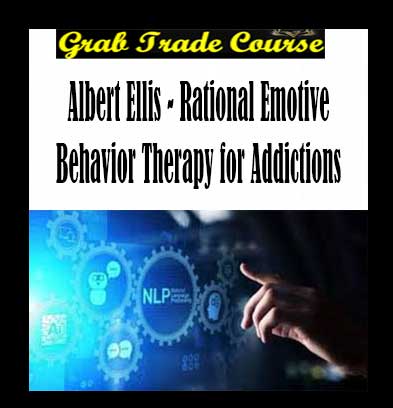Albert Ellis – Rational Emotive Behavior Therapy for Addictions
Description
Albert Ellis – Rational Emotive Behavior Therapy for Addictions review, Albert Ellis – Rational Emotive Behavior Therapy for Addictions download, Albert Ellis – Rational Emotive Behavior Therapy for Addictions free
Albert Ellis – Rational Emotive Behavior Therapy for Addictions
Rational Emotive Behavior Therapy for Addictions
by Albert Ellis
Learn to use Rational Emotive Behavior Therapy with clients struggling with addiction by watching the originator of the method in an actual therapy session.
Albert Ellis demonstrates his signature style with a difficult client; using rationality, strong language, and forceful directives, he is remarkably effective in just one session.
Orville would like to reduce his marijuana, alcohol and hallucinogen dependency but doesn’t know how. Ellis immediately focuses in on Orville’s low frustration tolerance and “self-downing” as the irrational beliefs that sustain his drug and alcohol addictions. Ellis debunks Orville’s claim that if he doesn’t always behave well, he is a bad person. He clarifies that it is certainly highly preferable to behave well, but that we are all fallible human beings who screw up sometimes. Orville’s distractibility and flights into tangential stories challenge Ellis to keep Orville on task. You’ll be impressed to see how Ellis remains focused on the issue at hand, pushing Orville to grapple with beliefs that are tough to change and addictive behaviors that are difficult to conquer.
In Depth
By watching this video, you’ll be able to:
• Utilize REBT techniques with clients struggling with addiction, including offering hypotheses about and disputing irrational beliefs, recognizing secondary gains and supporting rational thinking.
• Explain the REBT to your clients.
• Integrate Ellis’s use of confrontation, repetition and rational explanation in your own therapy work with clients.
Specs
Length of video: 00:52:07
English subtitles available
Bios
“There is virtually nothing in which I delight more,” says Albert Ellis,PhD “than throwing myself into a good and difficult problem.” His self-assurance—some would even say arrogance—enables him to confront his clients about their beliefs and tell them what is rational and what isn’t.
Albert Ellis was born in Pittsburgh in 1913 and raised in New York City. He made the best of a difficult childhood by using his head and becoming, in his words, “a stubborn and pronounced problem-solver.” A serious kidney disorder turned his attention from sports to books, and the strife in his family (his parents were divorced when he was 12) led him to work at understanding others. Ellis made it through college in 1934 with a degree in business administration from the City University of New York. His first venture in the business world was a pants-matching business he started with his brother. In 1938, he became the personnel manager for a gift and novelty firm.
Ellis devoted most of his spare time to writing short stories, plays, novels, comic poetry, essays and nonfiction books. By the time he was 28, he had finished almost two dozen full-length manuscripts, but had not been able to get them published.
In 1942 he returned to school, entering the clinical-psychology program at Columbia. He started a part-time private practice in family and sex counseling soon after he received his master’s degree in 1943. At the time Columbia awarded him a doctorate in 1947 Ellis had come to believe that psychoanalysis was the deepest and most effective form of therapy. He decided to undertake a training analysis, and “become an outstanding psychoanalyst the next few years.” The psychoanalytic institutes refused to take trainees without M.D.s, but he found an analyst with the Karen Horney group who agreed to work with him. Ellis completed a full analysis and began to practice classical psychoanalysis under his teacher’s direction.
In the late 1940s he taught at Rutgers and New York University, and was the senior clinical psychologist at the Northern New Jersey Mental Hygiene Clinic. He also became the chief psychologist at the New Jersey Diagnostic Center and then at the New Jersey Department of Institutions and Agencies. But Ellis’ faith in psychoanalysis was rapidly crumbling. He discovered that when he saw clients only once a week or even every other week, they progressed as well as when he saw them daily. He took a more active role, interjecting advice and direct interpretations as he did when he was counseling people with family or sex problems. His clients seemed to improve more quickly than when he used passive psychoanalytic procedures. And remembering that before he underwent analysis, he had worked through many of his own problems by reading and practicing the philosophies or Epictetus, Marcus Aurelius, Spinoza and Bertrand Russell, he began to teach his clients the principles that had worked for him.
By 1955 Ellis had given up psychoanalysis entirely, and instead was concentrating on changing people’s behavior by confronting them with their irrational beliefs and persuading them to adopt rational ones. This role was more to Ellis’ taste, for he could be more honest himself. “When I became rational-emotive,” he said, “my own personality processes really began to vibrate.”
He published his first book on REBT, How to Live with a Neurotic, in 1957. Two years later he organized the Institute for Rational Living, where he held workshops to teach his principles to other therapists. The Art and Science of Love, his first really successful book, appeared in 1960, and he has now published 54 books and over 600 articles on REBT, sex and marriage. He is currently the President of the Institute for Rational-Emotive Therapy in New York, which offers a full-time training program, and operates a large psychological clinic.
“I love my work and work at my loving,” Ellis says. “That is the secret of my present unusually happy state.”
Albert Ellis died in 2007.
Our Policies
A. Product Quality
We will provide GOOD quality of courses fast. If any issue, email: [email protected].
We sure that your problem will be support as soon as possible.
B. Digital Shipping Proceess
After your payment, we will review your payment, Then, we will send you PCLOUD LINK OF COURSES through email in 3 – 8 hours. If any issue, we will inform you as soon as possible.









Reviews
There are no reviews yet.